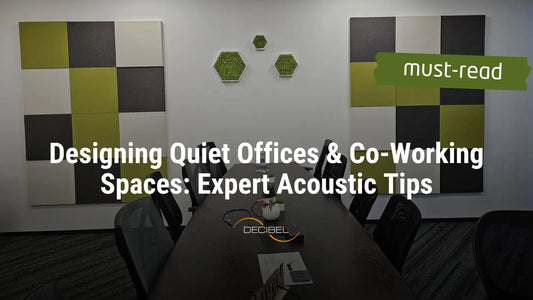
The Loudest Professions You Won't Believe Exist
Tanya IlievaShare
A pessimist is somebody who complains about the noise when opportunity knocks.
Oscar Wilde
From noisy construction sites to booming concert venues, we'll explore how noise affects different jobs and our health. Don't forget to subscribe if you're ready to learn more.
The article is available in video format too. Take a l👀k.
Why Noise at Work Matters
Noise isn't just annoying; it's bad for our health. Did you know that 22 million Americans have hearing loss because of loud work noise? Also, 58% of noisy job workers feel stressed and anxious.

How Noise Affects the Body
Sound waves travel through the air and stress our inner ears. This can harm hair cells that detect sound, causing hearing loss. Noisy workplaces can also raise stress and hurt our hearts. Loud noise makes our stress hormones rise, affecting our health. It messes up sleep, raises blood pressure, and makes us anxious.
Research suggests that people in noisy workplaces are more likely to have heart issues. They are prone to hypertension and heart disease due to high stress.
Also, loud noise triggers a rise in stress hormone levels, such as cortisol. This harms overall health. Persistent noise disrupts sleep. It also raises blood pressure and fosters anxiety and irritability. Recognizing the lasting harm from prolonged noise underscores the need to cut noise and prevent its harm.
Noise Exposure Standards
OSHA sets guidelines for safe noise levels at work. OSHA's permissible exposure limit (PEL) for noise is 90 decibels (dB), averaged over an eight-hour workday. Exposure to noise levels surpassing 85 dB over time can result in hearing loss. In addition, NIOSH recommends an exposure limit of 85 dB. This is for an eight-hour time-weighted average.

Standard Prevention Measures
Many professions use prevention measures. They reduce the impact of noise on workers' health. These measures involve offering PPE, like earplugs or earmuffs. They reduce noise reaching the ears. Also, employers may use engineering controls. These include soundproof barriers, acoustic enclosures, or noise-absorbing materials. They use these to reduce noise in the workplace.
The Problem with Noise Protective Gear
The Centers for Disease Control and Prevention says over 22 million US workers face dangerous noise levels. This raises the risk of hearing loss and other health issues. While earplugs provide quick relief from loud noises, they aren't a long-term solution for reducing noise exposure at work.
Studies show that using earplugs for a long time can cause discomfort, ear infections, and even hearing loss. Plus, relying only on earplugs doesn't solve the main problem of too much noise in the workplace. Although earplugs are handy, they need replacing often and can't be shared, leading to more costs and waste.

Earplugs give temporary relief. But, it's crucial to have lasting noise control. This calls for things like soundproofing and acoustic treatment. These steps are essential for protecting workers' long-term health and well-being.
Making Workplaces Quieter
We can make loud workplaces quieter with simple fixes. Acoustic panels and curtains can soak up noise. We can also move machines and desks to lower noise. Talking to sound experts can help find the best solutions.
Better layout and design can cut noise spread. Do this by placing machines, equipment, and workstations well. You can collaborate with acoustics professionals or sound engineers. They can offer tailored solutions for your noise concerns. This ensures a quieter, safer environment.
It's crucial to recognize that. With the right approach and investment in soundproofing and acoustics, it's possible to find and fix noise issues. This is true even in the loudest working spaces.
Top Ten Loudest Professions
#1 Aircraft Maintenance Engineers
They work in airport areas like maintenance hangars, runways, and taxiways. They are exposed to noise levels from 120 to 140 dB. This is like the noise of a jet engine during takeoff. To protect your ears, use high-quality ear protection. This includes noise-cancelling headphones or earmuffs.
Acousticians' Advice:
Learn from the best. Many companies choose to build aacoustic enclosures. They tailor them to absorb engine noise. They place the enclosures in locations like hangars where aircraft maintenance occurs. These enclosures are designed to absorb harmful sound. They work across the necessary frequencies. This fosters a quieter and safer work environment. Consulting experienced acoustical engineering firms can ensure the efficacy of these solutions.
#2 Demolition Workers
Demolition workers in construction face noise levels ranging from 90 up to 110 dB, akin to the noise level of a chainsaw or a jackhammer. They work in varied places, like construction sites and building interiors. They're advised to wear earplugs or earmuffs made for such settings to cut noise.
Acousticians' Advice:
Employ innovative soundproofing blankets for fencing construction sites. The blankets stop noise from entering homes nearby. They also lower noise on-site. Companies like DECIBEL sell custom-designed solutions. You can buy or rent them. They greatly reduce noise pollution during demolition. They make for a quieter and more neighbour-friendly work environment.

#3 Nightclub DJs
Nightclub DJs and other staff face noise levels from 100 to 120 dB. This is like the noise of a thunderclap or a close car horn. You work in loud, high-energy places with music and electronics. You need protective measures like custom earplugs or noise-cancelling headphones. They're vital for reducing the risk of hearing loss, but not a long-term fix.
Acousticians' Advice:
Use smartwatches to measure noise exposure levels. They track sound levels and alert when levels are unsafe. Also, investing in a well-designed acoustic environment for home practice sessions protects hearing. It also makes sound better. Whenever possible, opt for practising at quieter volumes than usual to mitigate risks.
#4 Machine Operators
Factory workers face noise levels from 85 to 105 dB. This is akin to the noise of factory machines or a power lawn mower. This is true for all workers, but especially for machine operators. Workers operate in manufacturing facilities, production lines, and assembly plants. They are urged to wear hearing protection devices, such as earmuffs or disposable earplugs, to protect their hearing.
Acousticians' Advice:
Consider installing customised sound enclosures around noisy equipment. TThey are tailored to fit precisely around any new or existing machinery. These enclosures ensure they don't disrupt equipment operation or workflow. They are engineered with doors or windows. They allow operators to see machine activity. They also reduce noise exposure.

#5 Fire Engine Operators
Firefighters, including fire engine operators, face noise levels from 90-110 dB. This is like the noise from a chainsaw or a motorcycle engine. They navigate dynamic and unpredictable environments. These include emergency scenes, fire stations, and rescue missions. You need standard hearing protection devices. They include communication earpieces and helmet-mounted earmuffs. They are crucial for cutting noise exposure during firefighting.
#6 Shooting Range Personnel
Gunfire can reach deafening levels. It can surpass 140 decibels (dB) for rifles and handguns. This poses a big risk to shooting range personnel. It includes instructors and range safety officers. They are exposed to these loud noises. Indoor shooting ranges may have even higher noise due to echoes and limited space. To address these dangers, shooting ranges should consider buying custom soundproofing. The soundproofing should be tailored to their layout and design.

Acousticians' Advice:
Implement specialised sound-absorbing targets or gum wall rubber walls behind shooting lanes. These custom barriers trap sound waves well. They stop the spread of sound and cut noise in the building. Shooting ranges can use engineering controls, like sound-absorbing barriers. They can use them along with protective gear to make a safer and healthier workplace for their staff.
#7 Formula One Drivers
Race car drivers, particularly those in Formula One racing, face noise levels ranging from 120 up to 140 dB, akin to a jet engine's takeoff noise. They compete on tracks, circuits, and motorsports venues globally. Race car drivers commonly use custom-fit earplugs or noise-cancelling headphones. They use these to protect their hearing and stay focused during high-speed races.
#8 Sports Facility Staff
Coaches and referees often deal with high noise in indoor arenas and stadiums. The noise ranges from 85 to 105 dB, like a lawn mower or factory machinery. They operate in diverse sports facilities, encompassing indoor arenas, stadiums, and gymnasiums. By regulating noise levels well, soundproofing and acoustics make all involved happier. They help coaches, referees, athletes, and fans.
Acousticians' Advice:
Acoustic specialists offer invaluable guidance. They help make effective soundproofing and acoustic solutions for sports facilities. The guidance extends beyond the venue's borders. These experts specialise in crafting strategies to improve the facility's acoustics. They also aim to reduce noise pollution in the area.

#9 Kindergarten Teachers
Teachers, especially in kindergarten, face noise levels from 70-90 dB. This is like the din of a robust vacuum cleaner or a busy office. They operate within classrooms, educational institutions, and school premises. During instruction, educators should prioritize their vocal health. They should recognize that acoustic treatment can ease vocal strain and improve speech clarity.
Acousticians' Advice:
Prioritise optimal acoustics in classrooms to facilitate effective communication and conducive learning environments.
Click HERE to see how we enhanced acoustics in Kindergarten Auffen in Austria.
Modern schools may have challenges. They have too much glass and reflective surfaces. These can make acoustic issues worse. These issues include reverberation and sound distortion. To tackle this challenge, consider engaging an acoustic specialist. They can test the room's acoustics. They can suggest solutions, like adding panels to walls and ceilings. These panels are designed to absorb sound reflections. This reduces reverberation and improves speech intelligibility.
#10 Professional Dog Groomers
Dog groomers and trainers contend with noise levels of 80-100 dB. This is like the noise of heavy traffic or a food blender. They operate within grooming salons, pet care facilities, and training centres. People commonly use ear defenders or noise-reducing earmuffs. They use them to lessen the effects of continuous exposure to barking dogs and the din of grooming equipment.

Acousticians' Advice:
Leverage sound absorption materials to manage ambient noise and curtail soundwave bouncing. You should soundproof to meet noise laws and avoid bothering neighbors. This will help you keep good community relationships.
Understanding the impact of noise is crucial for fostering a quieter and safer work environment. While we've shed light on some seriously loud professions, there's always more noise out there. If you found this information enlightening, please feel free to share it.
Subscribe to our Newsletter for additional content and stay tuned for upcoming articles.



